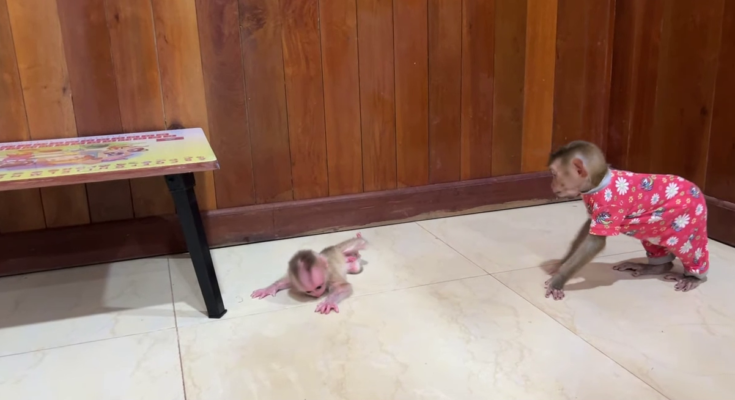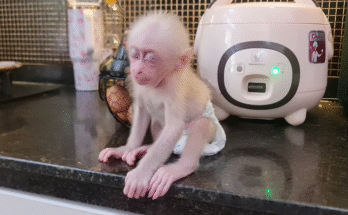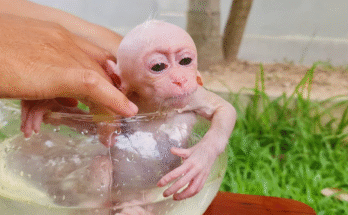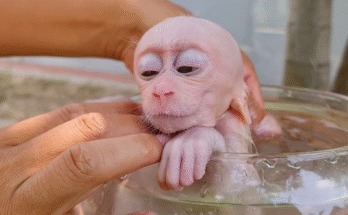Caring for a newborn monkey requires patience, knowledge, and dedication. Start by providing a warm, safe environment that mimics the comfort of their natural habitat. Feed them an appropriate diet, such as specially formulated milk or a veterinarian-recommended substitute, every 2–3 hours. Hygiene is essential—clean feeding bottles thoroughly and maintain a sanitary space. Gentle handling helps them feel secure and loved. Regular checkups with a vet are crucial for monitoring their health. Bonding through physical closeness promotes trust and emotional well-being. Proper care not only ensures their survival but also builds a strong, lasting relationship.
Essential Points to Understand About Caring for a Newborn Monkey
Caring for a newborn monkey is a delicate task that requires attention to detail, patience, and a deep understanding of their unique needs. These primates share many similarities with humans, but their care is specific to their species. Here are the key points you need to know to ensure the well-being of a newborn monkey:
1. Creating a Safe and Comfortable Environment
A newborn monkey requires a warm, secure space that mimics the natural conditions they would experience with their mother. Use soft blankets or towels to create a cozy nest, ensuring it is free from hazards like sharp objects or loose threads. Maintain a temperature between 85–90°F (29–32°C) to keep them comfortable, especially in the first few weeks.
2. Proper Nutrition
Feeding a newborn monkey requires careful attention. Consult a veterinarian to identify the best milk formula for their specific species, as cow’s milk is often unsuitable and can cause digestive issues. Feedings should occur every 2–3 hours, using sterilized bottles to prevent infections. Gradually introduce small amounts of mashed fruits or baby food as they grow, ensuring their diet meets their developmental needs.
3. Maintaining Hygiene
Cleanliness is critical for newborn monkeys, as they are highly susceptible to infections. Wash your hands before handling them and sterilize feeding equipment after each use. Clean their living area regularly and dispose of waste promptly to avoid attracting pests.
4. Health Monitoring
Newborn monkeys are vulnerable to various health issues. Regular veterinary checkups are essential to monitor their growth and address potential problems early. Watch for signs of illness, such as lethargy, lack of appetite, or abnormal stools, and seek immediate medical attention if these occur.
5. Emotional Bonding and Socialization
Newborn monkeys thrive on physical and emotional connection. Mimic the nurturing care of a mother by holding them close, stroking their fur, and speaking in soothing tones. This builds trust and emotional security. As they grow, gradually introduce them to other monkeys or companions to encourage healthy social behaviors.
6. Establishing a Routine
Monkeys, like humans, benefit from consistent routines. Set regular times for feeding, cleaning, and play to help them feel secure and reduce stress. A predictable schedule promotes better overall health and behavior.
7. Understanding Legal and Ethical Responsibilities
Caring for a newborn monkey comes with legal and ethical obligations. Ensure that you are complying with local regulations regarding primate ownership. Always prioritize the monkey’s welfare and consider their long-term needs, as they require years of commitment and care.
8. Enrichment and Mental Stimulation
Monkeys are intelligent and curious animals. Provide toys, climbing structures, and interactive activities to stimulate their minds and prevent boredom. Simple items like ropes, mirrors, and puzzle feeders can keep them engaged and promote natural behaviors.
9. Preparing for Growth and Development
Newborn monkeys grow quickly, and their needs change over time. Stay informed about their developmental milestones and adjust their diet, environment, and enrichment accordingly. Consulting with primate experts or joining forums can provide valuable guidance.
10. Building a Support Network
Caring for a newborn monkey can be challenging, especially for first-time caregivers. Connect with other primate owners, rescue organizations, or veterinarians experienced with monkeys to share advice and support. Online communities can be an invaluable resource for troubleshooting issues and gaining insights.
Final Thoughts
Caring for a newborn monkey is a rewarding yet demanding responsibility. By understanding their physical, emotional, and social needs, you can ensure their healthy development and happiness. Always prioritize their well-being and seek professional advice when needed. With dedication and love, you can provide the nurturing care they need to thrive.
A Soft Touch: How to Stop a Baby Monkey’s Crying Fit
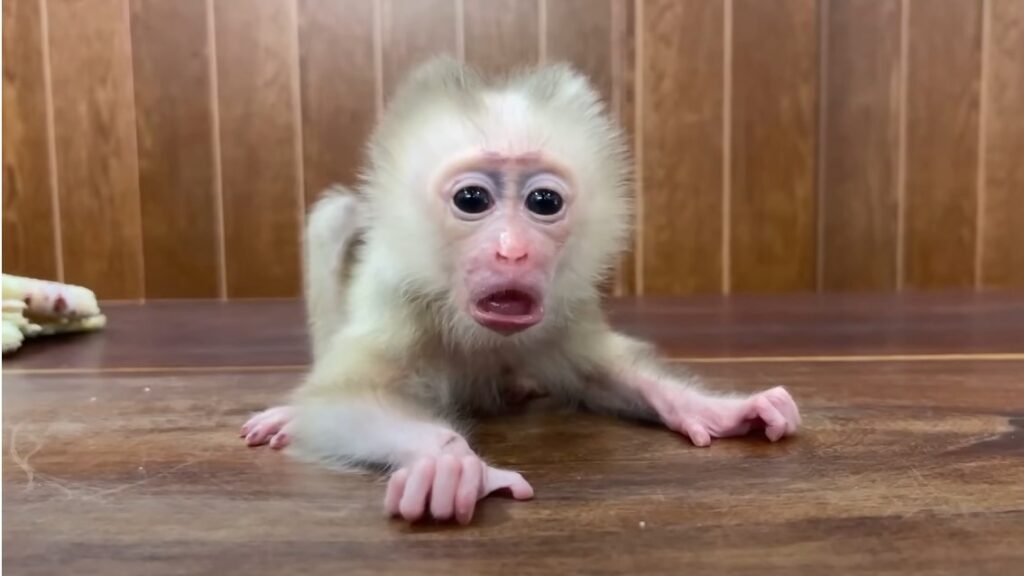
Soothe a crying baby monkey with care and precision! Start by identifying the cause—hunger, discomfort, or loneliness. Address these needs promptly with a gentle touch. A cozy blanket and warm cuddles mimic the mother’s comfort in the wild, fostering a sense of security.
Softly stroke their back or pat their head while speaking in a calm tone. This reassures them and reduces stress. Distract with engaging toys or soothing motions like rocking. A safe, loving environment is key to calming their nerves.
Master these tips to create a strong bond and turn tears into trust with ease!
A Soft Touch: How to Stop a Baby Monkey’s Crying Fit
Caring for a baby monkey is a unique and rewarding experience, but it comes with its own challenges—especially when the little one starts crying. Just like human babies, baby monkeys cry to express their needs, discomfort, or emotions. To effectively soothe them, it’s essential to approach the situation with empathy, patience, and a soft touch.
Understand the Cause of Crying
The first step in stopping a baby monkey’s crying fit is understanding why they are upset. Some common reasons include:
- Hunger: Ensure the monkey is fed on schedule with the appropriate formula or food suitable for its age.
- Discomfort: Check for any signs of illness, injury, or irritation. A quick health check can identify potential issues.
- Loneliness: Baby monkeys are social creatures that crave interaction. If they feel isolated, they might cry to seek attention.
By identifying the root cause, you can address their needs directly and effectively.
The Power of a Gentle Touch
Physical comfort is one of the most effective ways to calm a crying baby monkey.
- Cuddling: Wrap them in a soft blanket and hold them close to your chest. This warmth and closeness mimic the nurturing care they would receive from their mother.
- Stroking and Patting: Gently stroke their back, pat their head, or rub their arms. These soothing motions provide reassurance and signal safety.
- Rocking: A slow, rhythmic rocking motion can have a calming effect, helping them relax and fall asleep.
Use Calming Sounds
Your voice can be an incredible tool. Speak softly and calmly, using a soothing tone to comfort them. Some caregivers even play soft music or natural sounds, like gentle rain or forest ambiance, to create a relaxing environment.
Provide Distractions
Distracting a crying baby monkey can redirect their focus and ease their distress. Offer a favorite toy, colorful object, or activity to engage their curiosity. For monkeys, simple puzzles or chew toys often work wonders.
Create a Safe and Cozy Environment
The environment plays a crucial role in a baby monkey’s comfort. Ensure their space is clean, warm, and free from loud noises or sudden movements. Adding a few soft blankets and familiar items can make them feel secure.
The Importance of Consistency and Love
Consistency in care is key to building trust with a baby monkey. When they know you’re there to meet their needs, they’ll feel more secure and less prone to crying fits. Always approach them with love and patience, as their emotional well-being is deeply tied to the way they are treated.
When to Seek Professional Help
If the crying persists despite your efforts, it could be a sign of an underlying health issue. Consult a veterinarian or a primate specialist to ensure the baby monkey is healthy and thriving.
Conclusion
Stopping a baby monkey’s crying fit is a combination of understanding their needs, providing comfort, and creating a safe environment. With a soft touch and a caring approach, you can turn their tears into smiles and foster a deep bond built on trust and love.
By following these steps, you’re not just calming the baby monkey—you’re ensuring their overall happiness and well-being.
First Day Newborn Baby Monkey Cr-y Not Accept For New Home
